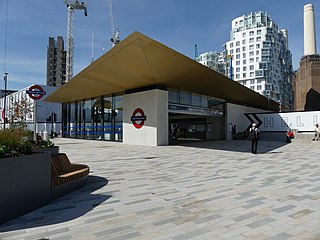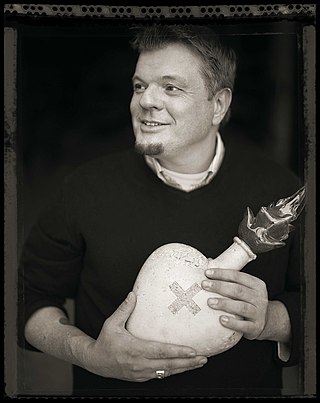Related Research Articles

Langlands & Bell are two artists who work collaboratively. Ben Langlands and Nikki Bell, began collaborating in 1978, while studying Fine Art at Middlesex Polytechnic in North London, from 1977 to 1980.

Maria Helena Vieira da Silva was a Portuguese abstract painter. She was considered a leading member of the European abstract expressionism movement known as Art Informel. Her works feature complex interiors and city views using lines that explore space and perspective. She also worked in tapestry and stained glass.
Dame Sonia Dawn Boyce is a British Afro-Caribbean artist and educator, living and working in London. She is a Professor of Black Art and Design at University of the Arts London. Boyce's research interests explore art as a social practice and the critical and contextual debates that arise from this area of study. Boyce has been closely collaborating with other artists since 1990 with a focus on collaborative work, frequently involving improvisation and unplanned performative actions on the part of her collaborators. Boyce's work involves a variety of media, such as drawing, print, photography, video, and sound. Her art explores "the relationship between sound and memory, the dynamics of space, and incorporating the spectator". To date, Boyce has taught Fine Art studio practice for more than 30 years in several art colleges across the UK.
Eva Rothschild RA is an Irish artist based in London.

Art on the Underground, previously called Platform for Art, is Transport for London's (TfL) contemporary public art programme. It commissions permanent and temporary artworks for London Underground, as well as commissioning artists to create covers for the Tube map, one of the largest public art commissions in the UK.

Hélio Oiticica was a Brazilian visual artist, sculptor, painter, performance artist, and theorist, best known for his participation in the Neo-Concrete Movement, for his innovative use of color, and for what he later termed "environmental art", which included Parangolés and Penetrables, like the famous Tropicália. Oiticica was also a filmmaker and writer.

Tate Britain, known from 1897 to 1932 as the National Gallery of British Art and from 1932 to 2000 as the Tate Gallery, is an art museum on Millbank in the City of Westminster in London, England. It is part of the Tate network of galleries in England, with Tate Modern, Tate Liverpool and Tate St Ives. It houses a substantial collection of the art of the United Kingdom since Tudor times, and in particular has large holdings of the works of J. M. W. Turner, who bequeathed all his own collection to the nation. It is one of the largest museums in the country. The museum had 525,144 visitors in 2021, an increase of 34 percent from 2020 but still well below pre- COVID-19 pandemic levels. In 2021 it ranked 50th on the list of most-visited art museums in the world.

Battersea Power Station is a London Underground station in Battersea, London, which forms the terminus of the Northern line extension to Battersea.
Jordan Wolfson is an American visual artist who lives in Los Angeles. He has worked in video and film, in sculptural installation, and in virtual reality.

Jennifer Allen, known professionally as Quilla Constance, is a British contemporary interdisciplinary artist and lecturer, born in Birmingham, 1980.

Three Standing Figures 1947 is a large stone sculpture by Henry Moore. It was made in 1947–48, and exhibited at London County Council's first Open-Air Sculpture Exhibition at Battersea Park in 1948. Donated to the council, it has been exhibited at the park since 1950. It became a Grade II listed building in 1988.

Recumbent Figure 1938 (LH191) is an early sculpture by Henry Moore. It was commissioned by the architect Serge Chermayeff for his modernist villa at Bentley Wood, near Halland, Sussex. At the time it was made, it was Moore's largest stone sculpture. It was donated to the Tate Gallery in 1939, making it the first example of Moore's work in a public collection.
Renata Lucas is a Brazilian artist.

Ruth Ewan is a Scottish artist based in Glasgow, who focuses on projects looking at social movements and protests.
Karin Margareta Jonzen, née Löwenadler, was a British figure sculptor whose works, in bronze, terracotta and stone, were commissioned by a number of public bodies in Britain and abroad.

Tim Tate is an American artist and the co-founder of the Washington Glass School in the Greater Washington, DC capital area. The school was founded in 2001 and is now the second largest warm glass school in the United States. Tate was diagnosed as HIV positive in 1989 and was told that he had a year left to live. As a result, Tate decided to begin working with glass in order to leave a legacy behind. Over a decade ago, Tate began incorporating video and embedded electronics into his glass sculptures, thus becoming one of the first artists to migrate and integrate the relatively new form of video art into sculptural works. In 2019 he was selected to represent the United States at the sixth edition of the GLASSTRESS exhibition at the Venice Biennale.

Eddie Peake is a British artist. His work includes performance, video, photography, painting, sculpture and installation. His art focuses on "implicit drama within relationships between people", and "how things like desire, sexuality and depression impact on them".
Christina Mackie is a British artist who works in the fields of sculpture, video, photography and drawing.

Matthew Darbyshire is a British artist who lives and works in London.

Miri Segal is a new media artist currently living in Tel Aviv. Segal was born 1965, in Haifa, Israel. Since the late 90s she has created video and media installations, light objects and theatrical pieces. Prior to her career as an artist she studied Mathematics. In 1997, She received a PhD in mathematics from the Hebrew University in Jerusalem under the instruction of Prof. Menachem Magidor. In 1998, she studied Art at the San Francisco Art Institute. Segal owes her taste for the mechanisms of perception and the construction of sense-stimulating illusions to her mathematical background, according to art historian Hanna Almeka.
References
- ↑ Tate. "'Skateboarderistismatronics (fan)', Alexandre da Cunha, 2004". Tate. Retrieved 2022-05-01.
British-Brazilian artist Alexandre da Cunha
- 1 2 3 4 5 "Alexandre da Cunha Biography". Thomas Dane Gallery. Retrieved 2022-05-01.
- ↑ "Art on the Underground unveils permanent artwork for new Battersea Power Station Underground by our former MA Sculpture student, Alexandre da Cunha". RCA Website. Retrieved 2022-05-01.
our former MA Sculpture student, Alexandre da Cunha
- 1 2 "Alexandre da Cunha — Artists". Galeria Luisa Strina (in Brazilian Portuguese). Retrieved 2022-05-01.
- ↑ Pariante, Fabio (2021-12-14). "5 questions for artist Alexandre da Cunha". MuseumWeek magazine. Retrieved 2022-05-01.
I am an artist who works mostly with sculpture, using found and industrialized objects and materials
- 1 2 3 "Alexandre da Cunha - Artist - Saatchi Gallery". Saatchi Gallery . Retrieved 2022-05-01.
- ↑ Moura, Rodrigo (2006). Economies of Desire. Paço das Artes. p. 10.
things I found on the streets, in the front of houses, in box rooms, pantries, ready for the garbage can
- ↑ Tate. "'Skateboarderistismatronics (fan)', Alexandre da Cunha, 2004". Tate. Retrieved 2022-05-01.
- 1 2 "Alexandre da Cunha". Laumeier Sculpture Park. Retrieved 2022-05-01.
- ↑ Trigging, David. "Alexandre da Cunha – interview: 'All my work is about combining things and making them have a conversation, or sometimes an argument'". www.studiointernational.com. Retrieved 2022-05-01.
- ↑ Duarte, Luisa (2015-04-21). "Alexandre da Cunha". Artforum. Retrieved 2024-04-29.
- ↑ Pariante, Fabio (2021-12-14). "5 questions for artist Alexandre da Cunha". MuseumWeek magazine. Retrieved 2022-05-01.
Da Cunha is inspired by .. modernist architecture and Op Art.
- ↑ Collection, Zabludowicz. "Alexandre da Cunha | Artist". Zabludowicz Collection. Retrieved 2022-05-01.
- ↑ Harvey, Nicola (2008-06-02). "Alexandre da Cunha". Frieze. Retrieved 2022-05-01.
- 1 2 "Sunset, Sunrise, Sunset". Art on the Underground. Retrieved 2020-04-13.
- ↑ Myers, Lynne (2021-09-20). "alexandre da cunha unveils 100m kinetic artwork for london underground". designboom . Retrieved 2022-05-01.
- ↑ "Bloomberg New Contemporaries 2020 Digital Platform". New Contemporaries. Retrieved 2021-01-29.
- ↑ "Brighton CCA — Alexandre da Cunha". Brighton CCA. 2021. Retrieved 2022-05-01.
- ↑ Lloyd-Smith, Harriet (2018-08-06). "Sculptors Phillip King and Alexandre da Cunha to pair up for 'live' collaboration". Wallpaper* . Retrieved 2022-05-01.
- ↑ "Alexandre da Cunha". Office Baroque. Retrieved 2022-05-01.
- ↑ McLean, Matthew (2016-04-07). "Alexandre da Cunha - Thomas Dane Gallery, London, UK". Frieze. No. 179. ISSN 0962-0672 . Retrieved 2022-05-01.
- ↑ "MCA Chicago Plaza Project Alexandre da Cunha". Museum of Contemporary Art, Chicago . 2015-04-12. Archived from the original on 12 April 2015. Retrieved 2022-05-01.
- ↑ "Canal Contemporâneo | Agenda de eventos | Dublê". www.canalcontemporaneo.art.br. Retrieved 2022-05-01.
- ↑ "Alexandre da Cunha, Laissez-faire, 10 July - 13 September 2009". Camden Arts Centre. Retrieved 2022-05-01.
- ↑ Tate. "Alexandre da Cunha born 1969". Tate. Retrieved 2022-05-01.
- ↑ Collection, Zabludowicz. "Alexandre da Cunha | Artist". Zabludowicz Collection. Retrieved 2022-05-01.
- ↑ "Alexandre da Cunha". ICA Boston. Retrieved 2024-03-15.
- ↑ Terremoto. "MO.CO presents «Mecarõ. Amazonia in the Petitgas Collection»". Terremoto. Retrieved 2024-03-15.
- ↑ "ALEXANDRE DA CUNHA'S 'MIX' | FEATURES | MONSOON ART COLLECTION". monsoonartcollection.com. Retrieved 2022-05-01.
- ↑ "New Public Art is Coming to the Fenway". Boston Magazine. 2017-09-20. Retrieved 2022-05-01.
- ↑ "News - Alexandre da Cunha: Mix II at Rochaverá Corporate Towers". Thomas Dane Gallery. Retrieved 2022-05-01.